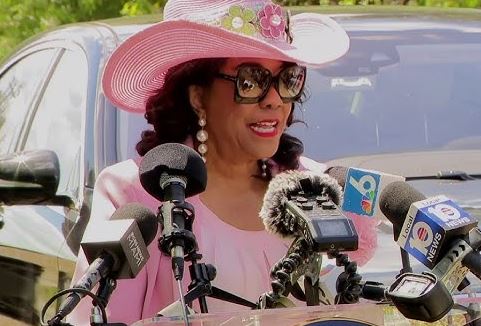Miami, FL (Le Floridien) – The recent death of Marie Ange Blaise, a 44-year-old Haitian woman who died while in U.S. immigration custody, has cast a troubling light on the conditions within America’s detention system—particularly at the Krome North Processing Center in Miami. Blaise’s case not only reflects a humanitarian failure but also reinforces the urgency of Congresswoman Frederica Wilson’s demand for federal oversight of the facility.
According to U.S. Immigration and Customs Enforcement (ICE), Blaise died on April 25, 2025, at 8:35 p.m., after being held for over ten weeks in ICE custody, including at Krome and other facilities. ICE has not yet confirmed the cause of death, stating that an investigation is underway. Blaise’s death is one among at least six reported deaths in ICE custody in the current fiscal year, a statistic that raises serious ethical and operational questions about the treatment of detained immigrants.
Blaise was initially detained in February at an airport in Saint Croix, U.S. Virgin Islands, for lacking a valid immigration visa while attempting to board a flight to North Carolina. After brief detention in San Juan, Puerto Rico, she was transferred to Krome, and later to a privately-run ICE facility in Louisiana, before her final transfer to the Broward Transitional Center in Pompano Beach, Florida—where she died.
A Systemic Breakdown: Dignity Denied in Detention
Though Marie Ange Blaise did not speak publicly, fellow detainees confirmed to USA TODAY that she endured the same degrading treatment they described: being chained for hours in buses without bathroom access, forced to sleep in overcrowded cells, and deprived of basic medical care and hygiene supplies. The women’s accounts raise grave concerns not only about comfort and dignity, but about basic human rights compliance in ICE operations.
These allegations directly echo the concerns that Rep. Frederica Wilson raised in her April 7 letter to Department of Homeland Security Secretary Kristi Noem, where she cited reports of women sleeping on concrete floors, inadequate food, and women housed in male-designated facilities at Krome. Wilson’s call for a congressional visit between April 11–28 was a constitutional appeal for transparency and accountability—one that, in hindsight, may have been too late for Blaise.
Why Blaise’s Death Matters
The case of Marie Ange Blaise is not isolated—it is emblematic. Her prolonged detention, lack of due process clarity, and eventual death under federal custody point to a system that is failing the most vulnerable it detains. When federal agencies hold people for weeks—sometimes months—without adequate medical attention or humane conditions, the consequences can be fatal.
Activist Guerline Jozef, director of the Haitian Bridge Alliance, captured the sentiment of many in the Haitian-American advocacy space:
“We strongly believe her death could have been prevented.”
That assertion is not speculative—it is rooted in years of advocacy work and documentation of systemic neglect within immigration detention centers.
Oversight Is Not Optional—It’s Urgent
Congresswoman Wilson’s request to inspect Krome was not merely symbolic. It was—and remains—a necessary act of congressional oversight in line with the Constitution and the moral obligation to protect human dignity. Her call was also contextually important: Krome holds a large number of Haitian detainees, many of whom come from communities within her South Florida district.

Wilson’s request demanded full transparency from DHS, and her concerns are now tragically validated. The death of a Haitian woman in the custody of a system under federal scrutiny strengthens the call not just for an inspection, but for a comprehensive review of detention policies, health protocols, and private facility contracts.
During a press briefing following her April 24 visit to the Krome Detention Center, Congresswoman Frederica Wilson delivered a powerful reflection that echoed decades of frustration and moral urgency.
“Today was a sad day for me. I toured the ICE Krome Detention Center today—43 years after my first visit—and it’s still plagued by the same terrible conditions. ICE is targeting countless hardworking immigrants, our neighbors, who deserve better. We must decide what kind of nation we want to be. America is a nation of immigrants, and every person deserves dignity. Our government must end its reign of terror against immigrant communities. PERIOD.”
Her return to Krome after 43 years makes this moment deeply personal and powerful. It reinforces the human stakes of her long-standing advocacy.
A Wake-Up Call for Reform
The passing of Marie Ange Blaise is a tragedy—but it must also serve as a call to action. Her death shows the urgent need for transparency, accountability, and robust federal oversight of immigration detention facilities nationwide. While the facility where she died lies outside Congresswoman Frederica Wilson’s district, her early demand for oversight at the Krome Detention Center reflects a broader concern for systemic failures across the entire ICE detention system. Blaise’s case tragically confirms the legitimacy and timeliness of Wilson’s appeal.
If the United States is to uphold its commitment to justice and human rights, it must begin by protecting the dignity of those it detains—especially in places like Krome, where silence has already proven deadly.
